- Home
- Robert Goddard
The Ways of the World
The Ways of the World Read online
ABOUT THE BOOK
1919. The eyes of the world are on Paris, where statesmen, diplomats and politicians have gathered to discuss the fate of half the world’s nations in the aftermath of the cataclysm that was the Great War.
A horde of journalists, spies and opportunists have also gathered in the city, and the last thing the British diplomatic community needs at such a time is the mysterious death of a senior member of their delegation. So when Sir Henry Maxted falls from the roof of his mistress’s apartment building in unexplained circumstances, their first instinct is to suppress all suspicious aspects of the event.
But Sir Henry’s son, ex-Royal Flying Corps ace James ‘Max’ Maxted, has other ideas. He resolves to find out how and why his father died – even if this means disturbing the impression of harmonious calm which the negotiating teams have worked so hard to maintain.
In a city where countries are jostling for position at the crossroads of history and when the stakes could hardly be higher, it is difficult to tell who is a friend and who a foe. And Max will soon discover just how much he needs friends, as his search for the truth sucks him into the dark heart of a seemingly impenetrable mystery.
Contents
Cover
About the Book
Title Page
Map
Chapter 1
Chapter 2
Chapter 3
Chapter 4
Chapter 5
Chapter 6
Chapter 7
Chapter 8
Chapter 9
Chapter 10
Chapter 11
Chapter 12
Chapter 13
Chapter 14
Chapter 15
Chapter 16
Chapter 17
Chapter 18
Chapter 19
Chapter 20
Chapter 21
Chapter 22
Chapter 23
Chapter 24
Chapter 25
Chapter 26
Chapter 27
Chapter 28
Chapter 29
Chapter 30
Chapter 31
Chapter 32
Chapter 33
Chapter 34
Chapter 35
Chapter 36
Chapter 37
Chapter 38
Chapter 39
Chapter 40
Chapter 41
Chapter 42
Chapter 43
Chapter 44
Chapter 45
Chapter 46
Chapter 47
Chapter 48
Chapter 49
Chapter 50
Chapter 51
Chapter 52
Chapter 53
Chapter 54
Chapter 55
Chapter 56
Chapter 57
Chapter 58
Chapter 59
Chapter 60
Chapter 61
Chapter 62
Chapter 63
Chapter 64
Chapter 65
Chapter 66
Chapter 67
Chapter 68
Chapter 69
Chapter 70
Chapter 71
Chapter 72
Chapter 73
Chapter 74
Author’s Note
About the Author
Also by Robert Goddard
Copyright
THE WAYS OF THE WORLD
Robert Goddard
SPRING, 1919
THEY COULD IGNORE the telephone. That was one of the unwritten clauses of the Armistice. No telephone would have rung unanswered for long at the squadron base in France where their paths had first crossed in the summer of 1915. But they were not in France. And the war was over. So there they stood, side by side, aware of the importunate ringing in the unattended office in the corner of the hangar, but unmoved by it, lulled by the scent of oil and varnish and the fluttering of a pigeon in the rafters and the vernal brightness of the light flooding in around them.
It was a silvery late-morning light that gleamed on the fuselages of an array of aircraft that had never strained through dives or loops in combat, or been strafed by enemy fire, because they had been constructed just as the war was ending and were now as redundant, for all their elegance and cunning of design, as the pair of youthful Royal Flying Corps veterans who were admiring them.
Even at a glance the two men would have struck an observer as dissimilar, so dissimilar that probably only the war could account for their ease in each other’s company. The taller and slimmer of them was James Maxted, former lieutenant, known to all but his family as Max. He had a good-looking face that held a promise of rugged handsomeness in middle age, boyishly flopping fair hair, pale-blue eyes and an ironic tilt to his mouth that hinted at cynicism. His companion, a shorter, bulkier figure, was Sam Twentyman, former sergeant. Max had served in the RFC as a pilot and known Sam as the most reliable and resourceful of the engineers who kept his plane in the air. Sam was five years older than Max, but looked younger, despite some greying of his curly brown hair, thanks to his round, rosy-cheeked face and general air of terrier-like eagerness.
‘You’re sure Bristols are the ones to go for?’ Max asked, arching a sceptical eyebrow. ‘Some of the lads who flew them said they preferred the Sopwiths.’
‘They did at first, sir,’ Sam replied. He still addressed Max as an NCO would an officer and showed no sign of breaking the habit. ‘But after all the modifications we made the Bristol was the best two-seater by a long chalk. You were out of circulation by then, of course.’
By ‘out of circulation’ Sam meant held for the duration in a prisoner of war camp in Silesia. Max smiled at the euphemism and stepped close enough to the nearest plane to run an appreciative hand over the burnished wood of its propeller vanes.
‘Well, you’re the boss, Sam.’
Now it was Sam’s turn to smile. They were spending Max’s money, not his. He had no illusions about who would be calling the tune in their future enterprise. ‘Will the budget stretch to a couple of SE5s, then? Beautiful machines, they are. Ten quid the pair. A real bargain.’
‘Is that what Miller said?’ Max nodded towards a scurrying, overalled figure who had just entered the hangar by a side-door and was heading towards the still-ringing telephone in the office. He wore an irritated frown on his thin, oil-smudged face. ‘The airworthiness certificates will treble that price, remember.’
‘You’re right. They will. But …’
‘But?’ Max turned and gazed at Sam expectantly.
‘Our customers will want to fly solo eventually.’
‘If I teach them well enough?’
Sam grinned. ‘You’re a natural, sir. You gave quite a few of the Hun a flying lesson, as I remember.’
The telephone had stopped ringing. Miller had finally answered it. In the welcome silence Max recalled the intoxicating pleasure of his first flight, a joy-ride from this very aerodrome eight years before, in the summer of 1911. Was it only eight years? It seemed longer, so very much longer, in so very many ways. Cambridge. Farnborough Flying School. The Western Front: those crazy days of scouting above the trenches, nerves stretched as taut as the rigging of his plane, ending in a crash behind enemy lines he had been lucky to survive – doubly so, given the rapidly declining life expectancy of pilots as the war advanced. Then eighteen months of tedium and privation in the POW camp. And now, here he was, back at Hendon, birthplace of his passion for flying, about to acquire a training squadron of his own at a knock-down price.
‘Miller would let you take one of the SE5s for a spin,’ Sam continued, ‘if that’s what you need to make your mind up.’
‘I’m sure he would. And I’m sure you reckon
it would make my mind up.’
‘They’re sweet as honey, sir.’
‘And we deserve some honey, don’t we, Sam, you and I?’ Max clapped his friend on the shoulder and was suddenly overtaken by a surge of optimism about their joint venture. He planned to call the flying school Surrey Wings. He had the perfect partner in Sam. He had the site, courtesy of his father. And soon, after a little horse-trading with Miller, he would have the planes. Flying was the future. For the first time in years, the sky was wide and blue and full of promise.
‘Mr Maxted.’
‘What?’ Max emerged from his fleeting reverie to find Miller looking towards him from the doorway of the office. ‘What is it?’
‘This call’s for you.’
‘For me? Impossible. No one knows I’m here.’
‘Well, evidently your mother knows. And she wants to speak to you. She says it’s urgent.’
‘My mother? Confound it all.’ Max glanced at Sam and shrugged helplessly, then hurried towards the office.
In the twenty seconds or so it took him to reach the telephone, Max concluded that the only way his mother could have tracked him to Hendon Aerodrome was first to have telephoned the flat. Saturday was one of Mrs Harrison’s cleaning mornings. He had mentioned his destination to her on his way out. She must still have been there when Lady Maxted rang. But as explanations went it did not go far. Lady Maxted was of a generation that scarcely made habitual use of the telephone. Off-hand he could not recall her ever calling him before.
He grasped the receiver. ‘Mother?’
‘James?’ No telephone line could drain from her voice the querulousness that always seemed to attach itself to her pronunciation of his name.
‘Yes. I’m here.’
‘I think you should come home at once.’ By home she meant Gresscombe Place, the house in Surrey where Max had spent a sizeable portion of his childhood and youth without ever quite thinking of it as home. ‘There’s been … an accident.’
‘What sort of accident?’ Max felt the mildest tug of anxiety, but nothing more. Surviving the aerial war in France had inured him to most of the calamities of everyday existence. Whatever his mother might be about to say, it surely did not represent a turning point in his life.
But such moments come when fate decrees. And this was such a moment. ‘It’s your father, James,’ said Lady Maxted. ‘He’s been killed, I’m afraid.’
MAX USED TO tell any friends who asked about his father that they could know him as well as he did simply by studying his entry in the Foreign Office List. He was only half-joking.
MAXTED, Sir Henry, 2nd Baronet, born 1853. Educated Eton and Trinity College, Cambridge. Clerkship in the Foreign Office, 1875. Assistant Private Secretary to Lord Granville, 1880–82. 3rd Secretary, Vienna, 1882–86. Vice-Consul, Budapest, 1886–89. 2nd Secretary, Tokyo, 1889–91. Home attachment, London, 1891–92. 2nd Secretary, Constantinople, 1892–96. 1st Secretary, later Chargé d’Affaires, Rio de Janeiro, 1896–1910. (Succeeded as 2nd Baronet, 1897.) Consular Counsellor, St Petersburg (later Petrograd) 1910–18.
That was as much as the latest edition revealed. There was no mention of Sir Henry’s father, Sir Charles Maxted, a diplomat in his own right as well as a noted Assyriologist, who had earned the baronetcy his son inherited through his negotiation of the route of the Odessa–Tehran telegraph in the 1860s. Nor was his marriage to Winifred Clissold, the future Lady Maxted, alluded to. Their eldest son, Ashley, was born in 1882, Max’s senior by nine years. Max was born in Tokyo, during the last posting on which his mother accompanied his father. She professed a dread of Turkish sanitation and sent her husband off to Constantinople alone. The threat of yellow fever precluded her joining him in Rio de Janeiro and by then the pattern was set. Lady Maxted led a contented life in Surrey with little thought (as far as Max could tell) for Sir Henry’s activities a continent or half a world away.
So it was that Max knew his father merely as an occasional visitor during periods of leave, which often coincided with his school or university terms, thereby limiting their contact to a stilted conversation in an Eton or Cambridge tea-room. Sir Henry struck the young Max as a gruff, stiff, emotionally restrained man, the archetypal diplomat in that sense, who conversed with his son about as freely as he might with an official of a foreign government. But perhaps he was too gruff and stiff for his own good. Rio de Janeiro was far from the diplomatic high road and St Petersburg was no place for him to spend the concluding years of his career. Lady Maxted sometimes referred to him ‘losing his way’, though precisely how he had done so she never specified.
Retirement was bound to reunite Sir Henry and Lady Maxted in due and problematical course. It came while the Great War was in its final months and Max was still a prisoner of the Germans. But by the time he was repatriated, in January 1919, Sir Henry was abroad on government business again. The British delegation to the Paris Peace Conference required the services of expert advisers in numerous fields. Sir Henry was asked to be one of them. He departed with what Lady Maxted later described as ‘alacrity’.
Who, in the circumstances, could blame him? Paris, even in the aftermath of the war to end all wars, was still Paris. He was hardly to know that death lay in wait for him there.
After a hurried explanation, Max left Sam to stall Miller as best he could and set off for Surrey.
He and his mother had never enjoyed the warmest of relationships. There were reasons for that they had never spoken of and probably never would. He was not her idea of what a son should be. Nor was she his idea of a good mother. Still, Sir Henry’s sudden death was an event which even Max acknowledged as a family emergency. His place, now if hardly ever, was at home. So, home he went.
The journey took longer than he would have wished, involving a forced march to Hendon station, a train to St Pancras, a hectic crossing of London by Tube and another train from Waterloo to Epsom. The Tube he particularly loathed. The horror of confinement he carried with him from the camp meant his nerves were tested whenever he descended into the Underground’s malodorous depths. The services were busy that day, reminding him how uncomfortable he now was amidst any mass of humanity.
He was, of course, unduly familiar with death in numerous forms and disguises, thanks to the swathe it had cut through his squadron in France. But there were many men of his age carrying gruesome memories with them into the genteel peacetime world. He would have claimed no distinction on that account. He had fully expected to die himself. The expectation had aged him, he suspected. He was young, in the veritable prime of his life. But he did not always feel so.
Yet the depression that had claimed some had never touched him. ‘You’re a tough ’un and no mistake,’ Sam had once said to him, in the wake of a particularly heavy day of losses, when Max had been keener to discuss minor adjustments to the gun-mounting on his plane than mourn the comrades he had seen shot down in flames. But toughness was not quite it. Max knew that to allow himself to care would be fatal. ‘This is all just a joke we can’t quite see the funny side of, Twentyman,’ he had replied. And he had believed it. That was why he had laughed the afternoon his luck had run out behind German lines and, with a failed engine and a jammed gun, he had gone down like a falling leaf spiralling through the Flanders sky.
But his luck had not quite run out, not to the last morsel. The shots that had stopped his engine had missed his fuel tank by a matter of inches. And the ground was flat and soft enough to make some kind of a landing. He had emerged, to his own astonishment, in one piece.
And that astonishment stayed with him to this day, as an unsmiling light-heartedness, a blithe disregard for how others expected him to lead his life. It meant the news of his father’s death, though surprising, had not shocked him. He was not indifferent to such things, but he was well accustomed to them.
His mother had supplied little in the way of concrete information. Sir Henry had died in a fall from a roof, apparently. It was, Lady Maxted had emphasized, an accident. ‘A tragic
and dreadful accident.’ How she could be sure of that she did not say and Max had known better than to ask. He would attempt to elicit more details when he reached Gresscombe. His brother would be there. He might be in possession of the facts. When it came to facts, Ashley could generally be relied upon. Sir Ashley, as he was now, of course. Max was going to find it hard to think of him as such, but he supposed he would grow used to it. Ashley himself would relish the status of the baronetcy, though perhaps not as much as his wife. Lydia had the prize for which Max suspected she had married his brother – and many years earlier than she could have expected. She would be mourning her father-in-law, but with secret satisfaction.
All in all, Sir Henry Maxted’s passing was unlikely to prompt an outpouring of grief among his relatives. For the last twenty years and more he had been largely absent from their lives. He attributed this, in one of his typically lofty phrases, to ‘the exigencies of the service’, and Lady Maxted never suggested it was otherwise. To Max, however, it seemed an arrangement that suited both parties to the marriage. How Sir Henry filled the waking hours not given over to the tireless and patriotic pursuit of British interests in foreign parts Max could only imagine. As for his mother, good works, Surrey society and occasional forays to London appeared to content her, though Max had cause to believe that had not always been the case, if indeed it was now.
Sir Henry’s death raised a delicate issue, however, one which Max turned over uneasily in his mind as the train steamed slowly through the countryside south of Wimbledon. He had not yet told Ashley of the agreement he had reached with their father and he doubted if Sir Henry had either, since there would surely have been some reaction to the news from his brother. The question now – the devilishly tricky question – was whether Ashley would honour the agreement, as the new owner of the Gresscombe estate. If not, Max’s plans for the future, along with Sam’s, would go badly awry. He had not mentioned this disturbing possibility to Sam. It had not actually occurred to him until after he had left Hendon. Without the land his father had promised him, there could be no flying school. And the land was now in his brother’s gift.

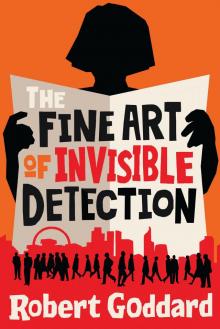 The Fine Art of Invisible Detection
The Fine Art of Invisible Detection One False Move
One False Move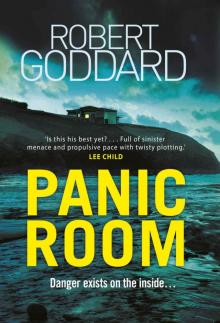 Panic Room
Panic Room Beyond Recall
Beyond Recall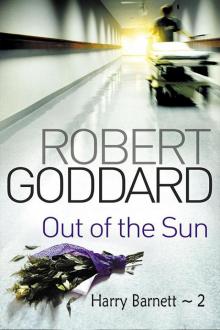 Out of the Sun
Out of the Sun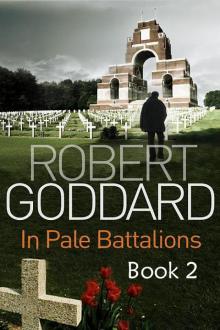 In Pale Battalions - Retail
In Pale Battalions - Retail Painting The Darkness - Retail
Painting The Darkness - Retail The Corners of the Globe
The Corners of the Globe Name To a Face
Name To a Face Closed Circle
Closed Circle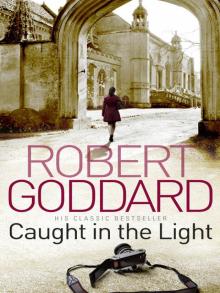 Caught In the Light
Caught In the Light Into the Blue
Into the Blue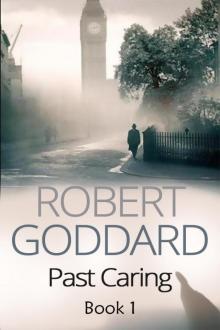 Past Caring - Retail
Past Caring - Retail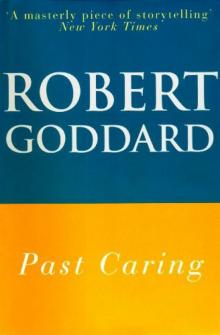 Past Caring
Past Caring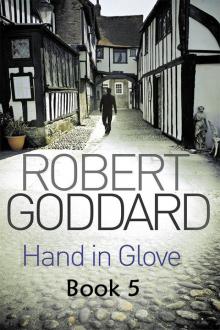 Hand In Glove - Retail
Hand In Glove - Retail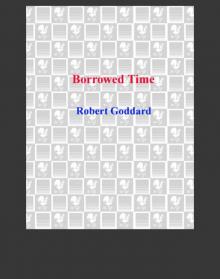 Borrowed Time
Borrowed Time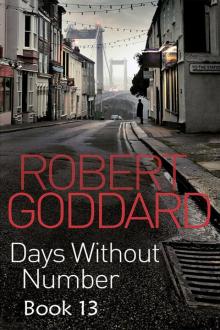 Days Without Number
Days Without Number James Maxted 03 The Ends of the Earth
James Maxted 03 The Ends of the Earth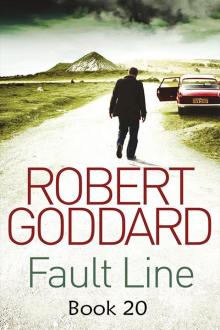 Fault Line - Retail
Fault Line - Retail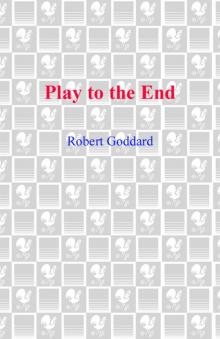 Play to the End
Play to the End Sea Change
Sea Change Never Go Back
Never Go Back Take No Farewell - Retail
Take No Farewell - Retail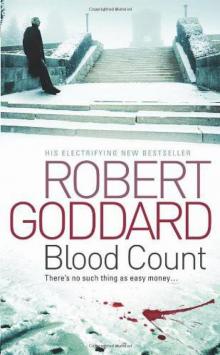 Blood Count
Blood Count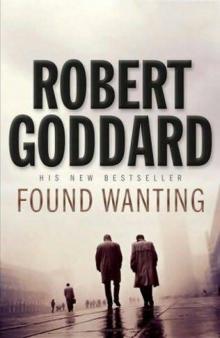 Found Wanting
Found Wanting Sight Unseen
Sight Unseen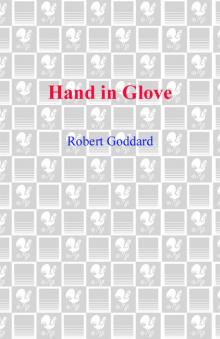 Hand in Glove
Hand in Glove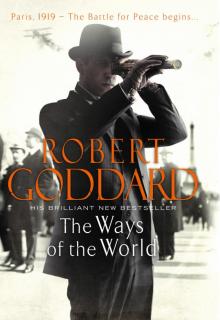 The Ways of the World
The Ways of the World